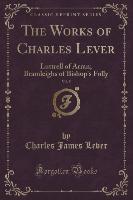- Start
- The Works of Charles Lever, Vol. 5
The Works of Charles Lever, Vol. 5
Angebote / Angebote:
Excerpt from The Works of Charles Lever, Vol. 5: Luttrell of Arran, Bramleighs of Bishop's Folly
"One half the world knows not how the other half lives, " says the adage, and there is a peculiar force in the maxim when applied to certain remote and little-visited districts in these islands, where the people are about as unknown to us as though they inhabited some lonely rock in the South Pacific.
While the great world, not very far off, busies itself with all the appliances of state and science, amusing its leisure by problems which, once on a time, would have been reserved for the studies of philosophers and sages, these poor creatures drag oh an existence rather beneath than above the habits of savage life. Their dwellings, their food, their clothes, such as generations of their fathers possessed, and neither in their culture, their aspirations, nor their ways, advanced beyond what centuries back had seen them.
Of that group of islands off the northwest coast of Ireland called the Arrans, Innishmore is a striking instance of this neglect and desolation. Probably within the wide sweep of the British islands there could not be found a spot more irretrievably given op to poverty and barbarism. Some circular mud hovels, shaped like beehives, and with a central aperture for the escape of the smoke, are the dwellings of an almost naked, famine-stricken people, whose looks, language, and gestures mark them out for foreigners if they chance to come over to the mainland. Deriving their scanty subsistence almost entirely from fishing and kelp-burning, they depend for life upon the chances of the seasons, in a spot where storms are all but perpetual, and where a day of comparative calm is a rare event.
Curious enough it is to mark that in this wild ungenial spot civilization had once set foot, and some Christian pilgrims found a resting-place. There is no certain record of whence or how they first came, but the Abbey of St. Finbar dates from an early century, and the strong walls yet attest the size and proportions of the ancient monastery. Something like forty years ago the islanders learned that the owner of the island, of whose existence they then heard for the first time, proposed to come over and live there, and soon afterwards a few workmen arrived,
and, in some weeks, converted the old crypt of the Abbey into something habitable, adding two small chambers to it, and building a chimney - a work of art - which, whether meant for defence or some religions object, was, during its construction, a much-debated question by the people. The intention to resume a sovereignty which had lain so long in abeyance would have been a bold measure in such a spot if it had not been preceded by the assurance that the chief meant to disturb nothing, dispute nothing of Vested interests. They were told that he i who was coining was a man weary of the world and its ways, who desired simply a spot of earth where he might live in peace, and where, dying, he might leave his bones with the Luttrells, whose graves for generations back thronged the narrow aisle of the church. These facts, and that he had a sickly wife and one child, a boy of a few years old, were all that they knew of him. If the bare idea of a superior was distasteful in a community where common misery had taught brotherhood, the notion was dispelled at sight of the sad sorrow-stricken man who landed on an evening of September, and walked from the boat through the surf beside his wife, as two sailors carried her to shore.
About the Publisher
Forgotten Books publishes hundreds of thousands of rare and classic books. Find more at www.forgottenbooks.com
Folgt in ca. 5 Arbeitstagen

